| 1950s | 1960s | 1970s | 1980s | 1990s |
We've added a new feature that allows you to create your own lists from our database of recognized novels and short stories. You can set your own date ranges. Change the citation numbers to focus on more popular titles.
After completing The Defining Science Fiction Books of the 1950s, I decided to push ahead into the 1960s. Going through the databases and assembling the list was a shock to my memory. I remember the 1960s being a tremendous decade for science fiction, and it was in volume, but I just don’t know how many of the books I found to list here are actual classics. I’ve reread far fewer of these titles than I did for the books from the 1950s, so I’m going more from distant memory than recent. And I padded the list with more books I remember reading about but haven’t read. I included them because they still sound good enough to track down in 2013. Many of these books listed below are ones I discovered researching the Classics of Science Fiction website, so they stick in my mind.
Also, I’m doubting the completeness of my databases. I had to consult several sources to find many of the titles I “remembered.” If I had to actually make up this list from cold memory it would be far shorter. I needed tools like the Internet Science Fiction Database to trigger buried recollections.
In the 1960s I loved shopping for books so much that I would visit bookstores two or three times a week. Towards the end of the decade I learned how to go to flea market and garage sales and offer to buy whole boxes of paperbacks cheap. I’d then take them to 2 for 1 trade in stores. I got to know the science fiction sections of several used bookshops in Miami. So looking for cover art for this list was a trip down memory lane.
I’d often read a book a day back then. Which is probably why I don’t remember these books so well – I read fast, and consumed science fiction in mass quantities. Some do stand out, especially the titles I’ve reread over the years. In terms of ideas, the 1960s were rich in original content. Most of the 1950s was spent reprinting the classic stories of the 1930s and 1940s pulp area. This still happened, but less often. Heinlein’s great short novel Orphans in the Sky from 1963, is really two novellas from the early 1940s, “Universe” and “Common Sense.” Thus it’s very hard to think of Orphans of the Sky as a classic 1960s novel.
Twelve 1960s SF Books That Might Be Remembered in the 22nd Century
The original essay I wrote about the 1950s was inspired by the Library of America’s collection of 1950s science fiction. I assume Library of America will published a collection for the 1960s, and then the 1970s. After collecting all the most memorable titles from the 1960s that I could find, favorites just don’t jump out at me like they did for the 1950s. However, I would say this short list of books are the standout science fiction books of the 1960s, the ones most remembered by people who don’t normally read science fiction. These are the titles I think will be remembered by literary scholars in the future, if they’re willing to read science fiction.
- Solaris by Stanislaw Lem (1961)
- Stranger in a Strange Land by Robert A. Heinlein (1961)
- A Clockwork Orange by Anthony Burgess (1962)
- The Man in the High Castle by Philip K. Dick (1962)
- A Wrinkle in Time by Madeleine L’Engle (1963)
- Dune by Frank Herbert (1965)
- Flowers for Algernon by Daniel Keyes (1966)
- The Moon is a Harsh Mistress by Robert A. Heinlein (1966)
- Do Androids Dream of Electric Sheep? by Philip K. Dick (1968)
- Stand on Zanzibar by John Brunner (1968)
- Slaughterhouse Five by Kurt Vonnegut, Jr. (1969)
- The Left Hand of Darkness by Ursula K. Le Guin (1969)
I personally think Stand on Zanzibar is one of the standout SF novels of the 1960s, but it’s quickly becoming forgotten. When it comes down to the nitty-gritty I’d say Stranger in a Stranger Land and Dune are the quintessential novels of the 1960s. They aren’t my favorites, but I think they are the ones remembered by the most people.
What’s fascinating to think about, is this list of books will be how the 1960s will be remembered by science fiction readers in the future. Even though science fiction is mostly set in the future, it’s really about the period in which it was written. Psychoanalyzing the 1960s through the lens of science fiction is going to be very weird, especially when our descendants look back on us through the eyes of Philip K. Dick.
Here’s the larger list I worked from, the titles that hard core science fiction fans should easily remember and love. These are the books that I either read, read about, won awards, or are often talked about at the Classics of Science Fiction Book Club. Compiling this list makes me want to reread a lot of books.
| 1960 | |
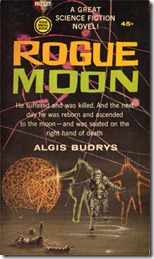 |
|
| 1961 | |
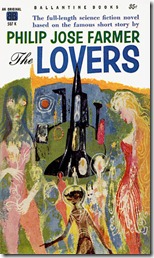 |
|
| 1962 | |
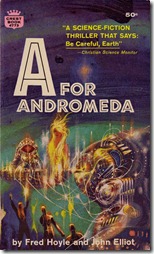 |
|
| 1963 | |
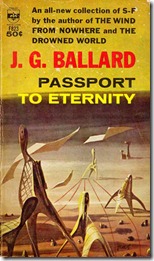 |
|
| 1964 | |
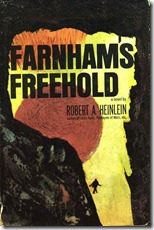 |
|
| 1965 | |
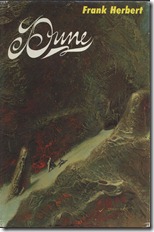 |
|
| 1966 | |
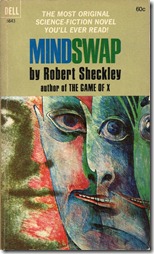 |
|
| 1967 | |
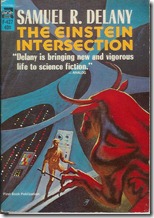 |
|
| 1968 | |
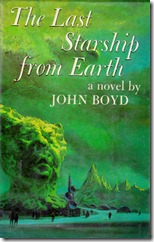 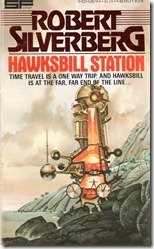 |
|
| 1969 | |
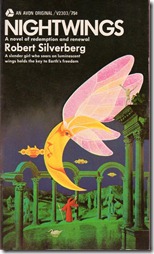 |
|
1960s SF: My Personal Favorites
- Empire Star by Samuel R. Delany
- Stand on Zanzibar by John Brunner
- Flowers for Algernon by Daniel Keyes
- Slaughterhouse-Five by Kurt Vonnegut, Jr.
- Orphans of the Sky by Robert A. Heinlein
- Do Androids Dream of Electric Sheep? by Philip K. Dick
- Nova by Samuel R. Delany
- Rite of Passage by Alexei Panshin
- Podkayne of Mars by Robert A. Heinlein
- Stranger in a Strange Land by Robert A. Heinlein
- Dune by Frank Herbert
- The Martian Time-Slip by Philip K. Dick
- Way Station by Clifford D. Simak
- The Man in the High Castle by Philip K. Dick
- Babel-17 by Samuel R. Delany
- The Left Hand of Darkness by Ursula K. Le Guin
- The Einstein Intersection by Samuel R. Delany
- Mindswap by Robert Sheckley
- Four for Tomorrow by Roger Zelazny
- This Immortal by Roger Zelazny
- Behold the Man by Michael Moorcock
- Omnivore by Piers Anthony
- The Past Through Tomorrow by Robert A. Heinlein
- The Moon is a Harsh Mistress by Robert A. Heinlein
- The Three Stigmata of Palmer Eldritch by Philip K. Dick
- Hothouse/The Long Afternoon of Earth by Brian Aldiss
- Pilgrimage: The Book of the People by Zenna Henderson
- A for Andromeda by Hoyle & Elliot
- The Last Starship From Earth by John Boyd
- The Dream Master by Roger Zelazny
- Dimension of Miracles by Robert Sheckley
- The Witches of Karres by James Schmitz
- Make Room! Make Room! by Harry Harrison
- The Eleventh Commandment by Lester del Rey
- The Drowned World by J. G. Ballard
- Lord of Light by Roger Zelazny
| 1950s | 1960s | 1970s | 1980s | 1990s |
JWH – 4/7/13 – Table of Contents

The trouble is that science fiction has gotten DUMB since the 60s. Or maybe I should say that much of the stuff called science fiction today isn’t really. It is like the definition has changed over 40 years. The producers of Star Wars and Roger Ebert said Star Wars was not science fiction in 1977 but now the majority of people think it is, and most of them were born since the original Star Trek went off the air.
So the people claiming and trying to be sci-fi writers today must try to make money selling into this evolved market. It is very ironic since it is technology that helped water down science fiction. This technology makes it possible to create extremely impressive special effects. But it can just as easily create dragons as realistic aliens so how many viewers do not care about the difference between fantasy and science fiction?
I think there’s plenty of intelligent SF out there, but it’s written, and it’s not very popular. Star Wars is fantasy. It’s Lord of the Rings set in space. Galactic empires are the new middle Earth.
I find it silly to state that SF has become “Dumb”
If anything almost all of the classics are rendered near unreadable because of how naive and cheap the writers of the age was.
And I’m not just talking Tech, but the whole Gee Whiz Wally Gobbledygook that passed as Classic SF.
People forget that Sturgeon’s Law has been around for a very long time.
You can look at the Classic SF films of the 50’s and see the exact same thing. Silly plot lines along with even sillier dialog.
The so called GOAT Foundations serious by Asimov starts off with a Dipsheet being given a planet instead of being executed.with his new partner shaking in his boots one second thinking for a fact they are all getting the death penalty only to start acting like he’s been raped because instead of being executed, they were given a whole planet to make a library “How Dare you just give him his own Planet” he started yelling in the court.
Now that is Retarded. And it was surrounded by silly stuff just like that. Not to mention that Asimov couldn’t fathom that computers could hold all the information of books(Nook anyone) and that they would have to have a whole planet to store all the books so the information wasn’t lost.
Now that SF writer was a Scientist and he couldn’t understand computers holding large amounts of data?
Now I call that something other then a classic.
Anyway there are many that think it’s the Greatest Ever. And thats that golden age you’re speaking of.
And of Course Star Wars is SF. Even it’s name is. Yes it’s a fantasy too, Alien is a Horror movie but it’s SF first.
Oh, I agree that the old stuff is pretty silly at times. And the Foundation series doesn’t make a lick of sense. Science fiction on the whole is often based on very unscientific ideas. What people fall in love with are the stories. You imprint on what you discover when you’re young, and for most people, that’s what they stick with. Robin, if you’re from the Star Wars generation, then that’s what you will love and defend for the rest of your life.
There are many definitions of SF, and by some, Star Wars is certainly science fiction. But I, and the early poster, probably use a different definition. What I call science fiction are those books that take a current scientific discovery and extrapolate a possible future that illustrates that concept. The best example is The Time Machine by H. G. Wells. The concept of time travel is fantasy. What made The Time Machine science fiction, at least by my definition, is the extrapolation about the evolution of mankind into new and divergent species, and the speculation about the evolution of the Earth and the Sun. As far as I know Star Wars doesn’t speculate in that way.
Science fiction can be defined as stories with spaceships, robots, space travel, aliens, etc. That’s how most people define it. At one time, all those concepts were speculative ideas. That’s when I call something science fiction. I think of science fiction as speculating about possible futures. What science fiction has become is stories set in backgrounds created for previous stories of speculations. There’s a slight distinction, but not much.
I would not say Foundation does not make a lick of sense. It is a kind of replay of the fall of the Roman Empire combined with a failure of leaders to use the knowledge they have.
Look at today’s economy. How can we pretend that “planned obsolescence” has not been happening for decades? Galbraith was writing about it in 1959. What about Vance Packard? So if consumerism crashes in this century who is to blame? Double-entry accounting is 700 years old but we don’t make it mandatory in our schools.
The idea of predicting the future doesn’t make a lick of sense. Read The Black Swan. Even in Asimov’s time, the idea that people could predict the future should have been unscientific. There are just too many variables. And Asimov was claiming plans could be made for events thousands of years into the future.
It’s a fun idea, but not very scientific.
“Now that SF writer was a Scientist and he couldn’t understand computers holding large amounts of data?”
The Foundation series was begun in 1941. The ENIAC computer was not operational until 1945 and not announced to the public until 1946. The first hard disc drive was 1956 and could hold 5 megabytes. That would be about 15 sci-fi books from those days. You just seem to think you are really smart because you have a perspective from 70 years later.
You Classic list is way too small. The greatest novels that you don’t include in your short list were by Silveberg and Simak and Delany especially. Way Station and Time is the Simplest Thing by Simak, Nova, Babel 17 by Delany, Nightwings, Thorns, Masks of Time, and The Man in the Maze by Silverberg, Camp Concentration , The Genocides by Disch, Hothouse, Greybeard by Aldiss, Pavane by Roberts, Davy by Pangborn,, one of the world (Burning, Drowning or Crystal) or all three books by Ballard,The Planet Buyer andThe underpeople published as one novel in the 70’s as Norsrilia by Smith,The Three Stigmata of Palmer Eldritch, Ubik, Martian Time-Slip by Dick,Rogue Moon by Budrys, A Clockwork Orange by Bugess,The Man Who Fell to Earth by Tevis, oh an so many othes should all be on the short list. i have been rereading and other than Dune and Strangers in a Strange Land I loved them all.
My short list was just the most famous of the famous, books that people outside of science fiction would have even heard about. The long list were the books hardcore SF fans should remember.
One very interesting thing about science fiction is how it gives examples of real human behaviour. Deathworld II (The Ethical Engineer) is an excellent example of this. People hiding information about technology from each other.
All of these computers are von Neumann machines and we hardly ever hear the term. Have we passed the point where processing power matters and it is all about quality of information?
That’s what I love about science fiction, writers can imagine all kinds of possibilities. It’s not predicting the future, but sometimes they hit on something that works out to be right.
Catching up here James. This, 50’s, 70’s are an excellent take/reminder of some great books. I particularly wanted to thank you for including Chandler’s Rim of Space, Spinrad’s Bug Jack Barron and Anderson’s Butterfly Kid. I think if someone simply read this three, they’d have a pretty darned good idea of the wealth of territory SF covered during the period.
I’ve seen all three books being discussed in the last year. What we have to worry about is whether younger readers will dig up these books, or if its just us old guys talking about our old favorites.
Thank you so much for your lists here. I discovered the title I only had vague recollections about after reading in highschool. Two-headed person in desert, science fiction. There it was at the top of the list: A Canticle for Leibowitz.
I just noticed, there is nothing by Alan E. Nourse in the lists. His Star Surgeon was my very first SF book. I wonder if there has been any study of how the first books that kids really like imprints on them. LOL But I think the Star Surgeon by Nourse is better than the one by James White. Nourse had things to say besides “look at all of these cool aliens”. The blurbs did not say the story was about racism back then but it was noticeable in the story even when I was nine.
Love ‘Canticle, and agree completely on ‘Zanzibar. A few other favorites listed: Deathworld, High Crusade, Little Fuzzy, Algernon, and Soldier, Ask Not. You bring back a lot of good memories. I bookmarked the site, time to head over to Amazon and see how much treasure I can dig up.
No Mack Reynolds?
Mack Reynolds didn’t show up on the radar – the various sources I used that remembered the books of the 1950s. I remember him though. I remember he was a frequent contributor to Astounding and later Analog. Reynolds was very prolific, but if you look at his bibliography on Wikipedia nothing stands out as being famous, and few works are hyperlinked, which means no one loved them enough to write a Wikipedia entry for them.
There’s so many I haven’t read here.Of those I have,not such a bad list.
Glad to see Dick’s “Galactic Pot-Healer”,so often dismissed in favour of his more “profound” books.The “Game Players of Titan” isn’t bad,but I thought some better books of his,such as “The Simulacra” could have been on there or in place of it.It was surely a decade in which he seemed to hold sway though;there’d have been much less fizz without him.
Also Silverberg’s “The Masks of Time”,which was better I thought than his novel of the early 1970s,”A Time of Changes”,which has however been better received.”Nightwings” also of course.
Ballard and LeGuin too,and of the latter,apart from “A Wizard of Earthsea” and the fabulous “The Left Hand of Darkness”,I haven’t read the earlier two of her’s,and am left pondering how good they are compared to the later novel.
“Dune” was inevitable of course,but I haven’t such fondness for it.Others such as “Dangerous Visions” were indespencible of course,but I haven’t read Carr and Wolheim’s anthology.Prehaps a few author anthologies could have included,but good to see Ballard’s “A Passport to Eternity”,and I’ve read all those in his “Collected Stories”.
Well done.
Hah! Someone else loves “Galactic Pot Healer”. I knew I wasn’t alone.
Readers choice of favorite PKD novel could be a standard psychological test to reveal personality traits. Mine is Confessions of a Crap Artist.
That’s a great one. I think I may be in the minority that enjoyed VALIS best, but I never really ranked the novels in my head. I just enjoy the entire zeitgeist of Dick.
VALIS is a definite favorite of mine too. I’ve recently read two biographies of Dick, and in the middle of a third, and bought a fourth. I wish I had more time to study him. Decades ago I went through another PKD reading jag, reading a couple of biographies, and gorging myself on as many novels as I could handle before his weirdness started affecting my consciousness. PKD is fascinating. I’ve even visited his grave in Colorado.
“Valis” takes a lot of stamina to get through and I think you’ve got to be a real granite Dick fan to be able to read it.I also think he wrote better books,although by the time he wrote “Valis”,his outlook had changed profoundly.
He was prolific,unusual and highly varible in one book after another,but even he’d never written a novel quite like “Valis”.
The world of mainstream literature left him out in the cold,but the SF genre were the only ones to have accepted him.He couldn’t have gone anywhere else in trying to find a home for his unique stuff,but he was a literary misfit who didn’t seem to have one made for him.SF itself isn’t really a genre,but is rather a cross section for many fictional styles and modes.
It was written not very long after “Do Androids Dream of Electric Sheep” and “Ubik”,both of which are great,but the’re quite famous SF novels,and it’s become almost a cliche to say so.It’s nice to be able to able to say the same about one of his more obscure novels such as
GPH,which is definitely one of his best.
It’s simple and not very profound in tone compared to some of his other books,but that turns out to be deceptive,and is also funnier and very neatly crafted.
Looking for a SciFi paperback that was in the 60s or 70s about the earth having no water and the USA under a dome for protection.
Can you help?
I’ll ask around. J. G. Ballard wrote a bunch of end of the world stories. I wonder if it was one of his.
It sounds something like his novel,”The Drought”,but don’t remember any American connection.Don’t think it’s anything by him.I’ve read all the stories.
Paul Geraud invents a space ship. Rescues a doctor. Works with the president. Several books in series. Part of his code name is1776. Book from late ’60 or early ’70’s
That doesn’t ring any bells at all.
I’m pretty sure this is “The Space Eagle” series by Whitman Publishing. I had Operation Doomsday when I was growing up, and there was another that I checked out of the library, but the name escapes me at the moment. I remember his spaceship being made out of some sort of high-tech plastic.
I hope to one day fond a paper back book called Starship.
From the 40s 0r 50s. Itwa about a starship in orbit around earth,
The people inside thought they were on the way to a new planet.
Would have made a great movie
Marvin
Brian Aldiss had a book out in 1959 called Starship. It’s about a generation ship going to another star.
I’ve been looking every few years for Sci Fi book published in the 1960s but cannot seem to find. I could have swore its title was “Star Kings,” but on reading the bios of any book with this title, the stories don’t mash. The closest I’ve come-up with is the conversation on this website: http://www.librarything.com/topic/107100, but none of those stories precisely fit my memory. The story was about the United Stars of Man at war with another space fairing species with similar technology. A small fleet of earth ships tests some new “cloaked propulsion” technology for a few weeks. When they come back into normal space, they find all their colonies and Earth totally destroyed (i.e. Earth is a glassy smooth molten rock with no outlines of land masses). The aliens they were at war with have suffered the same fate and were totally wiped-out. The rest of the book proceeds as a tale of accelerated technological/biological evolution of Man to catch up to the “Masters” who periodically search for technological races to wipe-out so they won’t compete against them. It was a great read…probably dated now, but many of the concepts of DNA manipulation and cybernetics were explored for such an old book……hope to find it someday!
James Foster
Los Angeles, CA
James, this doesn’t ring a bell, but I’m going to post your query to my science fiction book club.
Here’s what I heard back:
Sounds like it might be Crown of Infinity, by John Faucette, and African-American SF writer of the late sixties, early seventies. I found it and Siege of Earth in a used book store years ago.
Shadow
http://shadowflutter.blogspot.com
http://www.abebooks.com/servlet/SearchResults?sts=t&tn=crown+of+infinity
http://www.isfdb.org/cgi-bin/pl.cgi?8326
Here’s a blurb
Earth was gone … and with it humanity. But the last desperate defenders of the human race were still alive, regrouped in outer space, and restructured. All the ages of civilization culminated in that final act of defense and revenge–all science, art, and the lore of warfare were distilled into the new men, who called themselves defiantly the Star Kings.
The galactic history of the Star Kings, they who come after mankind, is the essence of this panoramic novel. It is a novel of the decline of one galactic civilization and the rise of another–one geared first to destroy, then to colonize, finally to rebuild on a scale that would know no boundaries, recognize no barriers, and establish new goals beyond the scope of any planet- bound race.
Crown of Infinity is a novel of limitless imagination that can only be compared with the sagas of Edward E. Smith, Olaf Stapledon, and the daring days of “classic” science-fiction.
If it’s comparable to Olaf Stapleton’s “Star maker” and “Last and First Men”,it should be more than worth reading.Stapleton though,as I’ve said elsewhere,also seems to have become a largely forgotten voice,no longer highly regarded by both the realms of general literature or science fiction.
I am tormented by a middle/junior high school read I found in my school library between 1979 and 1982 (not sure actual publishing date, just when I read the book).
On the cover I remember a transparent cube with a kneeling man pressing on the cube (like a mime) and a prone woman (both may be lacking clothing – maybe what drew me as a young man to the find). The cube was on a horizon with green grass and some trees in the background (if memory serves me right).
My memory and dreams have let me to a society (utopia) where citizens receive shots regularly. A man receives a note to try a gum wrapper under his shirt and see what changes as the needles cannot penetrate. He slowly ‘awakens’ and there is also a love interest.
Any ideas?
Thanks!
Rob
I’m afraid that’s not enough for me to go on. Maybe someone else reading these comments can help. You can use http://www.isfdb.org/ to help find books, and it will even show book covers. But hundreds of books come out each year, and you’re not even sure of the year.
I recommend this site that focuses on SF cover art: https://sciencefictionruminations.wordpress.com/
Jim
In 1963 I was 10. I think that was the year my grade school library bought a set of 16 juveniles by various Authors. That was it for me. I am now 65 and my wife and I have somewhere around 4,000 books in the house. We do not have many favorite writers in common, but 2\3 of our books are science fiction. I might have missed it but I am sad to see The Disappearance did not make your list.
The Disappearance is on the 1950s list for 1951. I thought I had forgotten it, but I hadn’t.
I do need to add Children of the Atom (1951) which I only recently discovered.
Every few years I go back and update these lists as I learn more. Thanks for the reminder.
I am trying to find the name of the book I read in 5th grade 1963 that had to do with some kids befriending some sort of alien guys having to do with spores mushrooms, maybew in the basement or something? thanks
Could it be this book:
https://en.wikipedia.org/wiki/The_Wonderful_Flight_to_the_Mushroom_Planet
yes it is, how cool, thanks so much
I have a stumper for you – My dad had a copy of a book that I borrowed and read that I can’t find right now (all of his things are in a mess in storage). I cannot remember the title, but I remember the plot. I think it was written in 1950s-1960s. It’s about a small pop-up company that appears randomly one day selling gold in a can. I believe the directions were putting lead into the can and sealing it and a certain time later you’d open and it would be gold and they could resell the gold based on the gold standard to the Federal Reserve. I can’t remember the author or the title and it’s driving me batty!
He has a very extensive collection of 50s & 60s sci-fi/fantasy, many out of print (including everything Jack Vance has ever written). I much prefer the old sci-fi/fantasy that had the blurred line between them (like things by Gordon R. Dickson, L. Sprague de Camp, & Jack Vance). Most sci-fi now is “hard” sci-fi. I get so frustrated (I’m a Librarian) when we don’t have anything for me to suggest for patrons because they’re all out of print. 😦
That rings no bells for me, but I’ll ask around.
Stevie Book at the Science Fiction Book Club on Facebook believes it’s Instant Gold by Frank O’Rourke. See this for the different editions and photos of the covers. http://www.isfdb.org/cgi-bin/title.cgi?766481
Here’s where you can buy it:
https://www.abebooks.com/servlet/SearchResults?sts=t&cm_sp=SearchF-_-home-_-Results&tn=Instant%20Gold&an=Frank%20O%27Rourke
Jim
Yes!! That’s it!! Thank you so much!
Hi,
I’m 66 and have a substantial sci fi library, > 2000 books. But I’ve been tormented for years trying to identify a science fiction story I read back in the late sixties or early seventies.
It was a story about a generation ship. Not sure if it was a full length novel or a short. It had the standard plot of the inhabitants not being aware that they were in an Interstellar generation ship. It’s not any of the obvious famous gen ship stories, I have all of them after all.
My memory of the story is very hazy. I remember that the hero has the typical dissatisfaction that comes from being trapped in a generation ship and not really understanding the universe. He went on some kind of a journey, climbs a very tall mountain, and at the top of that mountain he was actually up against the inner portion of the sky. He discovered a hatch of some sort, at that point I really have poor memory of what happened.
Some of the crew (who had a higher yet still incomplete understanding of the ship) somehow interacted with him; he was in trouble. I remember that the crew was divided into different responsibility castes. One such caste was called Atmospheres, responsible for air. From this point, I really don’t remember what happened at all.
Can anyone help?
Interestting thoughts